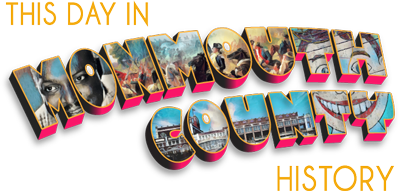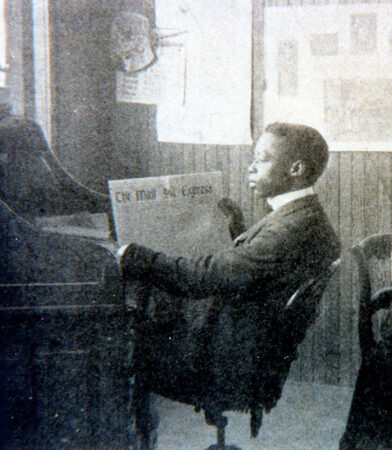Editor’s note: On or about October 4, 1901, a group of African American leaders from Monmouth County gathered in Red Bank to form a new political organization, the Afro-American Republican Union. Executive committee members included William E. Rock, publisher of The Echo, a Black newspaper, T. Thomas Fortune, another prominent African American newspaper publisher, and a man named Lewis O. Summersett, whose contributions to Monmouth County history have been largely overlooked. The following has been contributed by noted historian and author Randall Gabrielan for Monmouth Timeline.
By Randall Gabrielan
Lewis O. Summersett, born on December 27, 1877 in North Carolina, located in Red Bank by 1898, a town that became an important start in his varied and well-traveled career.
Summersett also attracted an even more prominent African American to town, New York newspaper publisher and resident, T. Thomas Fortune. The presence of one with a common mission provided each with a local ally, according to the Red Bank Register on August 7, 1901. Summersett as having been the draw of Fortune was not only reported at the time, but is logical, unlike prior beliefs that Fortune sought a locale in proximity to the rails as many New Jersey railroad towns are closer to New York than the southern reaches of the New York and Long Branch.
Summersett operated a job printing business prior to the 1900 start of his newspaper that he first published out of his residence. Initially titled Our Messenger or The Messenger, the publication soon evolved to the Mail and Express. Summersett’s full page advertisement in the W.A. Norton’s Red Bank, Atlantic Highlands, Highlands and Sea Bright Business Directory 1904-5 reflects confidence of continuity, but the paper appears to have succumbed in 1905 as indicated in the Register of November 6, 1907 with its report that a fire on November 1 destroyed his job printing shop at 37 West Front Street. Neither a surviving copy nor the paper’s precise termination date is known. Summersett, aware his firebrand style made enemies, suspected arson which apparently was not proven.
An underinsured Summersett rebounded with a local business career, serving as president and probably founder of the newly formed American Mercantile Company. The organization announced ambitious plans in 1907 to raise $125,000 capital in order “to build a large department store at Red Bank, buy land and homes and assist in securing the rental of decent housing for colored people,” as the New York Age reported August 29, 1907. Perhaps modeled on Fortune’s Afro American Investment Company, the aims for American Mercantile are outlined in a booklet of Summersett’s creation, “Open the Door of Hope.” Neither the workings nor the accomplishments of American Mercantile are known. Earlier that year he was president of Summersett, Evans & Company, Inc., a retail clothing store at the same 37 West Front Street that took a large advertisement in the Red Bank Register onMarch 27, 1907 to promote “Summersett’s Credit System.” The offer of credit appears to have been an effort to broaden and diversify his market, but the venture appears to have been short-lived.

Summersett activity in community life included participation in the Monmouth County Afro-Republican League and “a colored Knights of Pythias Lodge.”
By 1910 Summersett had relocated to Boston where he resided as a boarder, worked as a salesman for a stove manufacturer and became widowed. He returned to New Jersey by 1915 as the Montclair Times reported on August 14 that he was the secretary of a newly organized Negro Business League of Montclair, an auxiliary of the National Negro Business League headed by Booker T. Washington. Summersett organized The Summersett Manufacturing Company at Glen Ridge, New Jersey in 1922 to manufacture toilet preparations. Perhaps operations failed to materialize, or the firm was reorganized, as the next year he was with the Summersett Chemical Company in Philadelphia, also a manufacturer of toiletries that included a pomade, apparently a hair straightener. The Summersett relocation to Philadelphia was permanent. There he was remarried by 1940 and died in 1960. His Red Bank experience, although brief, is significant within Summersett’s long, ambitious career.
About the Author:
Randall Gabrielan began his second career as a local historian during the 1980s while engaged as an insurance broker, a spell during which he wrote articles, delivered his first talks, mounted museum exhibitions and began a long tenure as president of the Middletown Township Historical Society. In the 1990s, Gabrielan published the first of his many books, titles primarily on Monmouth County subjects, but also elsewhere in New Jersey and New York City. In 2000, he began a thirteen-year run as executive director of the Monmouth County Historical Commission, a body he now serves as vice-chair. Gabrielan and his wife, Carol Stout, live in Middletown.
Sources:
Colored Voters Organize. (1901). The Daily Standard, Red Bank, N.J., October 5, 1901, P. 2.
Colored Voters Organize. (1902). Red Bank Register, Red Bank, N.J., September 3, 1902, P. 9.
Summersett, Evans & Co., Inc. (Advertisement). (1907). Red Bank Register, Red Bank, N.J., March 27, 1907, P. 16.
A Colored K. of P. Lodge. (1903). Red Bank Register, Red Bank, N.J., P. 10.
Form Negro Business League. (1915). The Montclair Times, Montclair, N.J., August 14, 1915, P. 5.
Business Record News, New Jersey: Glen Ridge. (1922). Drug Trade Weekly, D.O. Haynes & Co. Publishers, New York, N.Y., January 28, 1922, P. 163.
Gabrielan, Randall. (1996). Images of America: Red Bank. Arcadia Publishing, Charleston, S.C., 1996.


Why do you ignore the oldest Black-owned newspaper in NJ, The Echo? Published & edited by Mr. William Elijah Rock, who worked with and supported the work of both T.Thomas Fortune & Mr. Summersett?
Is it because Mr. Rock was related to the late John Rock, the first African American admitted to the Massachusetts Bar and who was an abolitionist appointed a Justice of the Peace for Boston and Suffolk County, Massachusetts? Or because he’s directly related to the Lenni Lenape Tribe here in Monmouth County? My grandfather was the manager of the Summersett Publishing Company. His family assisted over 10,000 enslaved people to freedom per the Antebellum Underground Railroad, but you do not mention him; why? https://www.echonewstv.com/about
Ms. Brittingham-Edmond, please realize this project is only in its third year. While we have published more than 250 stories, there are many, MANY glaring omissions that we are fully aware of and intend to get to, in time. To say that these are stories we are “ignoring” is unfair. I’m one person running this whole show. My contributors choose their subjects, and thus far none of them has chosen to write about The Echo. If a writer wanted to contribute a story to the Timeline about The Echo, we would be very receptive to publishing that. – John Barrows, editor